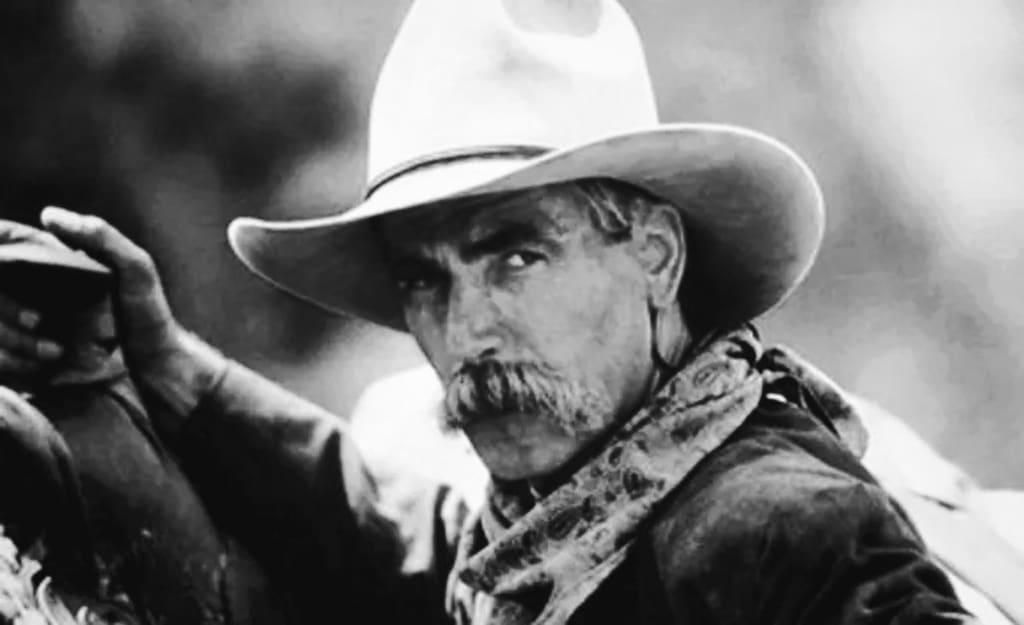
To him, life and his craft were a similar construction - easily measured and assessed. Like the shadow of a plumb line, it was the straight lines that gave both strength and purpose. Banty Aynesworth was a man governed by precision. He always arrived on time, his mule lurching in worn traces maneuvered artlessly by the taciturn man perched in the buckboard. But what he lacked in grace he made up for in practicality. Who knew what drew him to such a macabre profession? His stepfather, by all accounts, had been boisterous and dependable. Later in life, however, he would share his son’s penchant for keeping to the roads. Instead of putting Banty’s hand to the plow, he had put it to the saw, and taught him to tame thickets of wild-grown oaks and pines into sleek boards. From his stepfather also came Banty’s personal creed: “A man honors his commitments and see things through.”
This town blended together with all the rest: drab buildings clad in drab paint leaning drunkenly over drab brown streets. The summer rainy season was beginning, and the main road through town was a deception of potholes that trapped horses and dainty women alike. Banty arrived, his mule wheeeeHONK-ing in impotent rage as it struggled to pull the wagon through the mire. After settling in, Banty gathered a small crew and set to work. It took a week of laboring in the sticky heat before he was done, and on his last evening he ambled to collect his wages from the Sheriff. The law officer, Micah, was disgustingly jocular - at least to Banty, a man not taken to strong emotion either way.
“I took a stroll by the scaffold today, Banty and I got to say - quite good workmanship, Banty, quite good!” Micah gave his rotund belly a hollow slap of satisfaction. Ruddy cheeks beaming, his smile dimmed a bit as he waited for a response.
Banty mustered up, “Of course.”
He allowed himself some curiosity, and questioned about the inmate. While towns indistinguishably blurred, the criminals remained distinct. Stuffed down the backside of his scuffed jeans, he carried a small leather-bound book, worn to a creaseless black from the friction of travel. In it, he would record the deceased and their crimes. To give him a reason why – a distinct end to yet another straight line of purpose in his life.
The named accused added to Banty’s book this time was one Judah “Lightfoot” DuMande, a 17-year-old whose notable ability to remain unseen failed him when he attempted to steal a horse. In this country, being without a mount could spell your ruination. Banty had to grudgingly admit to himself - it was a shame for a life to be snuffed out so young. But then again, that was a matter between DuMande and his God.
As he scrawled hors theef on a blank page, a spark of remembrance flashed – gone in a moment. Glancing up, he asked, “May I talk to the prisoner?” Again, the need to know came unbidden, but he must satisfy it. Following the unlit hallway behind Micah’s desk to the solitary cell in the rear of the building, Banty could just make out a lanky fellow leaning against the small patch of window with face fixed plaintively upward. In the faint bronze cast of the setting sun, Banty could make out woeful eyes over a resolute chin. There was something recognizable about DuMande, but the thought skittered too wildly for him to trap.
Now before the prisoner, Banty couldn’t muster up anything worthy of conversation. He was used to the quiet open road, with none to listen but a cantankerous animal. Besides, for a boy with less than a day to live, what would he care about the goings-on of a town that would persist long after his bones had calcified under some unmarked plot? As he struggled to summon words, the young man had turned around. A look of surprise flitted across his face before being replaced by impassivity. DuMande said, “Didn’t think I’d have any visitors. How’ve you been?”
Surprised at the blunt familiarity, Banty’s reaction was swift and scornful. “Don’t worry ‘bout me none. Just – came to see, I suppose . . .” He awkwardly let the sentence hang, and then gruffly finished up, “Just a shame, ‘tis all.” The young man’s mouth opened as if was going to reply, but he did not. So Banty turned away.
Re-joining Micah, Banty concluded his business by accepting a small leather bag of his pay. Micah chirped, “No paper checks, sorry to tell ya. I don’t trust all them new governmint conveniences. You gonna stick around for tomorrow’s entertainment?” Though a distasteful choice of words, Banty haltingly agreed. He must see it through.
~*~
The clouds scuttled over the watery sunbeams unburdened themselves of their load, and brought a fine mist that made the heat muggy and intolerable. Toiling under sun and rain alike while building the scaffold had been its own particular hell, but the work consumed him, rendering discomfort meaningless. Slowly roasting amongst the jostling rabble was an avoidable inconvenience - one of the many reasons Banty usually chose to leave at sunup the day after business was done. On to the next town, the next hanging. As far as Banty was concerned, his commitments were only pledged to the lawmen who required his services.
There were other reasons too. He was immensely proud of his finished product: the even surface of strongly scented pine boards, sanded to splinter-less smoothness and elevated on thick club legs. And of course, a hole in the center of the platform for the Drop. But he could do without seeing it christened by death. At night while asleep under a boundless starlit sky, the names and faces of those hanged came to life in a grotesque pantomime, reminding him always that his “art” was naught but the machinery of destruction.
Rivulets snaked down his collar as he wiped water from the brim of his hat. He had chosen to stay in his wagon, giving him a good line of sight to the platform. A few soldiers -the prisoner transport - stood in a distressed huddle under the scant protection from the rain offered by the broad crossbeam. Also present was the minister, looking annoyed as he steamed in his dreary clerical garb. Even as the heat swelled and choked, the women’s bright church-day finery and men’s starched (but rapidly wilting) suit jackets stood in sharp contrast to the true nature of the spectacle.
Absently checking his watch fob, Banty had almost convinced himself to leave when the door to the Sheriff’s office swung wide. Out marched Micah leading DuMande, the boy’s brown hair plastered to his clammy forehead, though from fear or the humidity none could tell. His eyes rolled like a crazed horses’, though faced ahead at the looming scaffold. Micah was puffed up like a prized hen, greedy to share some of the crowd’s attention. The sheriff and prisoner crossed the yard, the clinking of the chains grating uncomfortably. As the duo mounted the steps, a band of locals playing badly tuned banjos cranked out a jarringly jaunty “Amazing Grace”.
The soldiers stepped forward to claim DuMande, flanking him on each side as his chain restraints were swapped for rope ones. The noose was lowered, then yanked to test the integrity of its knot; now it came to rest in a loose collar on DuMande’s shoulders. Micah stepped to the forefront and bellowed, “Thank you all fer comin’ today to see justice served! It’s a bit past time to get this show rollin’, so here’s the particulars: DuMande here got hisself caught while tryin’ to take a horse. Luckily I was quick to apprehend this criminal – “
Banty tuned out the self-aggrandizing lawman and instead focused on DuMande. The boy wasn’t standing with head bowed like most. He instead locked his steely gaze onto Banty’s.
Concluding his speech, the sheriff stepped down from the platform, coming over to stand by Banty’s wagon. Next up, the minister, to drone unenthusiastically about ashes and dust from the Holy Writ. Then DuMande was asked if he had any last words. Instead of some bold declaration, the boy turned his head and mouthed something inaudible to the minister, who nodded in satisfaction. Then, too, the minister descended the steps. Now came the moment all had waited for. Abandoned, DuMande stood ramrod straight as one of the soldiers came forward with an empty sack. All the while, eyes boring into Banty from thirty feet away.
Banty swelled with panic, chest constricted, as if he felt DuMande’s masked terror. The gaping upturned faces were eclipsed by the dense white landscape of a burlap bag. With senses obscured, the prickly friction of the rope and the give of the boards under the heavy lead feet of the soldier coming up from behind overpowered all other sensations. For the poor fool today, there would be no providential reprieve. Shrouded from the world of living, DuMande was condemned to the land of the dead.
The soldier reached up, pulled the cord for the trap door, and –
SNAP
The sound was the slap of the door rather than the breaking of the neck, but the effect was the same. It was that of a bullwhip over the now silent crowd, cowing them into confronting their own mortality. Banty couldn’t bear to watch the “death dance” and instead busied himself with untangling the reins knitted anxiously in his hands. Now that the amusement had been reduced to a swinging corpse, the jolly atmosphere sapped quickly from the crowd, and they dispersed back to their monotonous lives.
Micah coughed discreetly, and Banty turned. “One last piece o’ business for ya’.” The sheriff fished in his breast pocket and produced a dingy white envelope, crinkled and clearly unsealed. He waggled it tantalizingly. “One of the church ladies came by and took down a letter for that scoundrel, can you imagine?” Banty could not. “Anyhow, had t’confiscate it, though. He prob’ly couldn’t read it, no-how.”
“Somthin’ quite peculiar though.” Micah’s expression shifted from satisfaction to wariness. “It’s addressed to you! Quite peculiar . . .” He faded out, as if waiting to be informed. Banty remained mute but outstretched a calloused palm and accepted the envelope. Shrugging in feigned indifference, Micah’s interest roamed elsewhere and he ambled off.
It had been decades since he had read something so personal as a letter. As he surveyed the cheap paper and spidery salutation on the front, Banty unfolded the letter.
TO THE SCAFFOLD BUILDER:
I knew we would cross paths one of these days. Just like you, Pa built things real good, even a whole other life and family out on the road. I’m not surprised that you can’t recognize your own kin. Couldn’t be sure at first, but your handiwork spoke for you. I may have turned out bad but Lord knows a man can change.
Pa left an inheritance in the bank of Wichita. $20,000 for when I turned 18. I guess I won’t make it to claim it, but take this letter for proof and I’m sure they’ll let you. You did your duty, and I don’t blame you at all – know this.
Sorry I never could really know you as my step-brother, and I’m sorry it had to go this way.
-J. DuMande.
Banty took the deepest breath he ever had, and there was a feeling in his belly like a rivulet of clear spring water leaching over cracked desperate earth. Like his brother, he had been fettered by his guilt; now he was freed by forgiveness. Folding the paper, he stuffed it between the pages of his little journal. He had honored this commitment. Now on to honor another. Clicking his tongue, he eased his mule out of its stupor and into a brisk trot onto the main road.
To Wichita.
About the Creator
Ria Carriger
voracious reader. amateur chef. beginning archer. v short.
Enjoyed the story? Support the Creator.
Subscribe for free to receive all their stories in your feed. You could also pledge your support or give them a one-off tip, letting them know you appreciate their work.






Comments
There are no comments for this story
Be the first to respond and start the conversation.